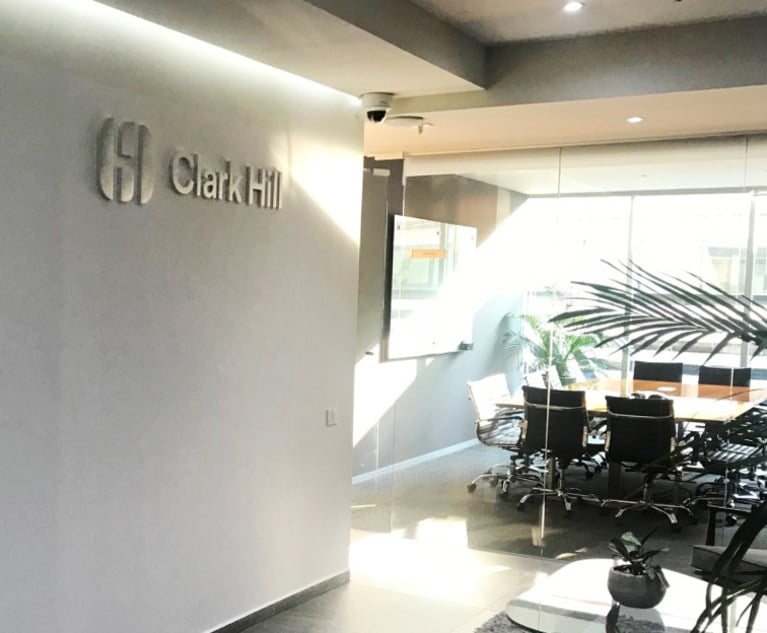 Greenberg Traurig's office in Fort Lauderdale.
Greenberg Traurig's office in Fort Lauderdale.Greenberg Traurig, Florida's Top Litigation Department, on the Legal Landscape and the Firm's Philosophy
The firm was named The American Lawyer's Florida Litigation Department of the Year.
January 06, 2020 at 03:18 PM
7 minute read
Last month, at The American Lawyer Industry Awards in New York, The American Lawyer honored the litigation departments of six law firms for their work in jurisdictions across the country: Connecticut, Georgia, Florida, New Jersey, Pennsylvania and Texas.
From the Florida Supreme Court to the U.S. Supreme Court and at stops in between, Greenberg Traurig, the winner in Florida, successfully argued matters ranging from constitutional challenges to class certifications and requirements for expert testimony.
The following Q&A contains responses from the firm's litigation department:
How would you describe the philosophy of your litigation department in terms of the types of matters you look to handle, the types of clients you look to represent and the way in which you approach cases?
Greenberg Traurig has over 600 litigators and our primary focus is on providing high quality, practical, and efficient legal services to our clients. Our geographic and practice area diversity, along with our deep bench of experienced lawyers, allows us to handle mass tort, class action, and other repetitive litigation across multiple jurisdictions, as well as complex commercial trial work in bet the company cases. Understanding where each case fits into the client's overall business and litigation landscape, allows us to be strategic partners.
Philosophically, we focus on the "team"—every lawyer and paralegal on a case has an important role to play, and we work together to serve our clients' needs. Team members are given opportunities to challenge themselves at all stages of their careers with meaningful assignments, and are not constrained by seniority, titles, or other artificial obstacles. All team members, regardless of roles, are expected to know the client's goals and how their work will help accomplish those goals. We try to provide an economical and efficient single-firm solution, leveraging our network of talented lawyers across large and small markets to secure the right subject matter expertise and billing rate efficiencies. Greenberg Traurig's litigators think not just as lawyers, but as advisers providing sophisticated case strategy, project management, and budgeting for our clients' matters from start to finish.
What cases this submission period best represent that philosophy and what did the firm's litigators do to get the client a successful result in those matters?
The matters that won the 2019 Florida Litigation Department of the Year demonstrate how we execute on our core philosophy. In each case, it was critical that Greenberg Traurig litigators follow a strategic approach and use game-changing tactics to achieve results.
When defending challenges to keeping the 2018 Florida Constitution Revision Commission's proposed amendments on the ballot in the state's 2019 election, Greenberg Traurig attorney Barry Richard convinced the court that voters should have the opportunity to vote on them unless it could be proven that they were missing language—rather than having restrictive or defective language.
Rather than acting only on the possible pending class actions in Kellie Loeb v. Champion Petfoods USA, Inc. and Champion Petfoods LP and Rhonda Williams v. Mosaic Fertilizer, LLC, Greenberg Traurig litigators surgically addressed the details of each expert witness' testimony, one witness and one issue at a time, to prove their clients weren't at fault.
To quickly end the threat of a potential tide of class-action litigation and high settlement costs for Loews Corporation and affiliates, Greenberg Traurig litigators convinced the court that the issue in question was limited to one person who patronized one hotel.
In Leidy Villaman v. United Parcel Service, Inc. and UPS International General Services, Greenberg Traurig litigators took the critical first step of removing the case to the U.S. District Court for the Southern District of Florida, knowing that this court has a more favorable summary judgment standard for the issue in question.
To give James Essie Butler the hope of freedom as soon as possible, Greenberg Traurig litigators did what his original attorneys didn't do: They meticulously mined witnesses who could speak to mitigating circumstances never before considered.
Finally, to convince the U.S. Supreme Court that it should hear Fane Lozman v. City of Riviera Beach, Greenberg Traurig's strategy focused on demonstrating that there was a split among the federal Courts of Appeal and how the case presented a good vehicle for the court to resolve the legal question.
How has the legal landscape in Florida evolved and how has the firm looked to adapt?
The Florida legal market has seen tremendous growth in recent years, with more national and international firms expanding into the region, creating an increasingly competitive marketplace for legal services. At the same time, the nature of litigation has changed with the advancement of technology, the increase in disputes going to arbitration rather than being resolved in court, and the increased demand from clients for alternative fee arrangements. Given Greenberg Traurig's 52 year-history in Florida with seven offices throughout the state, as well as a global platform, we have positioned ourselves as a firm that has both the local experience and the national and global reach to handle all client needs.
What are you doing to attract, train and retain new talent in the litigation department?
Key to Greenberg Traurig's success in attracting top lawyers and professionals is a combination of the firm's broad geographic platform and the cultivation of a strong entrepreneurial culture. Greenberg Traurig's promotion and compensation practices focus on rewarding collaboration and top performers. Additionally, to help nurture and encourage high-quality performance, our litigation group has a robust in-house training program which offers hands-on opportunities in a variety of areas, including legal writing, taking and defending depositions, working with experts, and advanced trial training. Depending on the training, we bring in judges, academics, and experienced trial lawyers to teach and train our litigation attorneys. Our goal is to create a comprehensive support system that provides meaningful opportunities for our attorneys to grow and develop into outstanding litigation and trial lawyers.
How does pro bono work factor into the litigation department's mission?
Greenberg Traurig's philosophy is that we do well when we do good. In our view, attorneys have a civic and moral obligation to give back to the communities that have supported us and to provide legal services to the neediest among us. To that end, Greenberg Traurig expects every attorney to dedicate time to pro bono cases, and associates are required to dedicate a portion of their time to pro bono work every year. While our attorneys engage in pro bono because the firm believes it is the right thing to do, pro bono work also ties into other missions in our litigation department. Greenberg Traurig regards associate development as a top priority and pro bono cases offer our associates the opportunity to develop their litigation skills, interact with clients, develop mentoring relationships with senior lawyers, and become more involved in local non-profit boards. Pro bono work is also an important component to the firm's mission to support our clients' community oriented interests. We strive to collaborate with clients on pro bono cases that are important to them and seek to support their pro bono missions. In sum, pro bono is an integral part to our firm's mission to provide great lawyering and superior client service, and to do well by doing good.
This content has been archived. It is available through our partners, LexisNexis® and Bloomberg Law.
To view this content, please continue to their sites.
Not a Lexis Subscriber?
Subscribe Now
Not a Bloomberg Law Subscriber?
Subscribe Now
NOT FOR REPRINT
© 2025 ALM Global, LLC, All Rights Reserved. Request academic re-use from www.copyright.com. All other uses, submit a request to [email protected]. For more information visit Asset & Logo Licensing.
You Might Like
View All

Longtime Reed Smith Health Care Partner Opts for Solo Practice Over Retirement
3 minute read
Law Firms Mentioned
Trending Stories
- 1'Pull Back the Curtain': Ex-NFL Players Seek Discovery in Lawsuit Over League's Disability Plan
- 2Tensions Run High at Final Hearing Before Manhattan Congestion Pricing Takes Effect
- 3Improper Removal to Fed. Court Leads to $100K Bill for Blue Cross Blue Shield
- 4Michael Halpern, Beloved Key West Attorney, Dies at 72
- 5Burr & Forman, Smith Gambrell & Russell Promote More to Partner This Year
Who Got The Work
Michael G. Bongiorno, Andrew Scott Dulberg and Elizabeth E. Driscoll from Wilmer Cutler Pickering Hale and Dorr have stepped in to represent Symbotic Inc., an A.I.-enabled technology platform that focuses on increasing supply chain efficiency, and other defendants in a pending shareholder derivative lawsuit. The case, filed Oct. 2 in Massachusetts District Court by the Brown Law Firm on behalf of Stephen Austen, accuses certain officers and directors of misleading investors in regard to Symbotic's potential for margin growth by failing to disclose that the company was not equipped to timely deploy its systems or manage expenses through project delays. The case, assigned to U.S. District Judge Nathaniel M. Gorton, is 1:24-cv-12522, Austen v. Cohen et al.
Who Got The Work
Edmund Polubinski and Marie Killmond of Davis Polk & Wardwell have entered appearances for data platform software development company MongoDB and other defendants in a pending shareholder derivative lawsuit. The action, filed Oct. 7 in New York Southern District Court by the Brown Law Firm, accuses the company's directors and/or officers of falsely expressing confidence in the company’s restructuring of its sales incentive plan and downplaying the severity of decreases in its upfront commitments. The case is 1:24-cv-07594, Roy v. Ittycheria et al.
Who Got The Work
Amy O. Bruchs and Kurt F. Ellison of Michael Best & Friedrich have entered appearances for Epic Systems Corp. in a pending employment discrimination lawsuit. The suit was filed Sept. 7 in Wisconsin Western District Court by Levine Eisberner LLC and Siri & Glimstad on behalf of a project manager who claims that he was wrongfully terminated after applying for a religious exemption to the defendant's COVID-19 vaccine mandate. The case, assigned to U.S. Magistrate Judge Anita Marie Boor, is 3:24-cv-00630, Secker, Nathan v. Epic Systems Corporation.
Who Got The Work
David X. Sullivan, Thomas J. Finn and Gregory A. Hall from McCarter & English have entered appearances for Sunrun Installation Services in a pending civil rights lawsuit. The complaint was filed Sept. 4 in Connecticut District Court by attorney Robert M. Berke on behalf of former employee George Edward Steins, who was arrested and charged with employing an unregistered home improvement salesperson. The complaint alleges that had Sunrun informed the Connecticut Department of Consumer Protection that the plaintiff's employment had ended in 2017 and that he no longer held Sunrun's home improvement contractor license, he would not have been hit with charges, which were dismissed in May 2024. The case, assigned to U.S. District Judge Jeffrey A. Meyer, is 3:24-cv-01423, Steins v. Sunrun, Inc. et al.
Who Got The Work
Greenberg Traurig shareholder Joshua L. Raskin has entered an appearance for boohoo.com UK Ltd. in a pending patent infringement lawsuit. The suit, filed Sept. 3 in Texas Eastern District Court by Rozier Hardt McDonough on behalf of Alto Dynamics, asserts five patents related to an online shopping platform. The case, assigned to U.S. District Judge Rodney Gilstrap, is 2:24-cv-00719, Alto Dynamics, LLC v. boohoo.com UK Limited.
Featured Firms
Law Offices of Gary Martin Hays & Associates, P.C.
(470) 294-1674
Law Offices of Mark E. Salomone
(857) 444-6468
Smith & Hassler
(713) 739-1250









